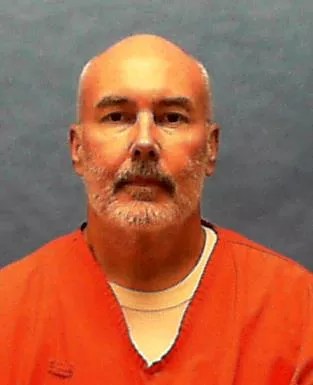
Photo by Florida Department of Corrections

Audio By Carbonatix
Sentenced to death for fatally stabbing 44-year-old Faye Vann while on the lam in Tallahassee, Donald Dillbeck is set to be executed next week, as planned, after the Florida Supreme Court rejected his pleas for relief.
In a February 16 decision, the court denied several motions filed by Dillbeck and his legal team in a bid to stave off his scheduled February 23 execution by lethal injection. Absent extraordinary intervention, Dillbeck will be strapped to a gurney next Thursday in the execution chamber of Florida State Prison and infused with an anesthetic, a paralyzing agent, and a lethal dose of potassium acetate.
Dillbeck’s attorneys argued to the Florida Supreme Court that the execution should be called off on the grounds that Dillbeck has a neurological disorder caused by heavy exposure to alcohol in his mother’s womb. They said that new research equates the disorder to a severe mental disability.
Dillbeck’s biological father testified in past proceedings that the mother drank 18 to 24 cans of beer a day while she was pregnant with Dillbeck. He said he left the family after she attacked him with a butcher knife when Dillbeck was two years old.
“[The fetal alcohol disorder] causes widespread brain dysfunction that impairs executive functioning and impedes development of the requisite level of culpability to justify imposition of the death penalty,” Dillbeck’s attorneys claimed.
The panel of seven justices ruled, however, that the argument was time-barred and inadmissible on procedural grounds. They found that the new research cited by Dillbeck is based on existing evidence, and that even if it were considered a breakthrough, Dillbeck took too long to raise the issue in court.
The judges rejected the notion that Dillbeck’s disorder is on par with intellectual disability that categorically excludes prisoners from being executed.
His intelligence quotient (IQ) is estimated to be around 100, that of an average person.
“We have long held that the categorical bar of Atkins that shields the intellectually disabled from execution does not apply to individuals with other forms of mental illness or brain damage,” the court opinion states, referring to a landmark U.S. Supreme Court decision on the execution of mentally disabled prisoners.

Donald Dillbeck murdered Faye Vann in a Tallahassee mall parking lot on June 24, 1990.
Photo by Florida Department of Corrections
The justices also denied Dillbeck’s argument that his execution after spending three decades on death row would amount to cruel and unusual punishment under the Eighth Amendment. The judges noted that Florida has never recognized execution following a long stay on death row as unconstitutional.
The Florida Supreme Court made it clear its decision was final: “No rehearing will be entertained by this Court, and the mandate shall issue immediately.”
Gov. Ron DeSantis signed Dillbeck’s death warrant on January 23.
The 59-year-old is scheduled to be executed at Florida State Prison in Raiford on February 23 at 6 p.m., marking the first execution since 2019 for Florida’s more than 300 prisoners on death row. The state has executed 99 prisoners since the death penalty was reinstated by the U.S. Supreme Court in 1976.
Dillbeck has been imprisoned since he was a teenager.
Originally from Texas, he was fifteen years old when he shot and killed Lee County Sheriff’s Deputy Lynn Hall in Fort Myers Beach on April 11, 1979.
The high school dropout from Indiana was sitting inside a stolen car at a closed beach park when Hall responded to a suspicious person complaint and began questioning him. Dillbeck fled but Hall chased him down. In the ensuing struggle, Dillbeck grabbed Hall’s gun and fatally shot him. He was sentenced to life in prison for the murder in June 1979.
Dillbeck escaped custody in June 1990 at an offsite vocational program. While on the run, he robbed, slashed, and stabbed Faye Vann, who was alone in her vehicle in a Tallahassee mall parking lot as her family shopped. Dillbeck stole her car but crashed it nearby and was promptly apprehended by police.
Dillbeck was convicted of first-degree murder, armed robbery, and armed burglary in connection with Vann’s fatal stabbing. His public defender aggressively lobbied for a life sentence in lieu of execution during the 1991 court proceedings.
“The penalty the state is seeking is an abomination! The rest of the world seems to know that,” the public defender said, according to a Tallahassee Democrat report.
“The only abomination in the courtroom today is Donald Dillbeck,” responded a state prosecutor.
In the years following Dillbeck’s 1991 trial, he and his legal team pleaded for mercy, citing abuse he suffered at the hands of his alcoholic mother.
His sister testified that their mom would order them to pray and beat them if they stopped mouthing their prayers. Dillbeck was removed from the home by the State of Indiana when he was four years old. His adoptive parents testified that they heard horror stories of his childhood, including how his mother assaulted him and made him eat chicken bones.
The tales of his dark upbringing and medical expert testimony about his alleged brain damage from fetal alcohol exposure failed to persuade Florida courts to void his death sentence. A string of habeas corpus petitions and post-conviction motions stretching back to the 1990s fell flat.
In 2020, the court rejected an appeal based on his fetal alcohol disorder, finding that he did not timely file for relief after the condition was formally recognized by the medical community in 2013.